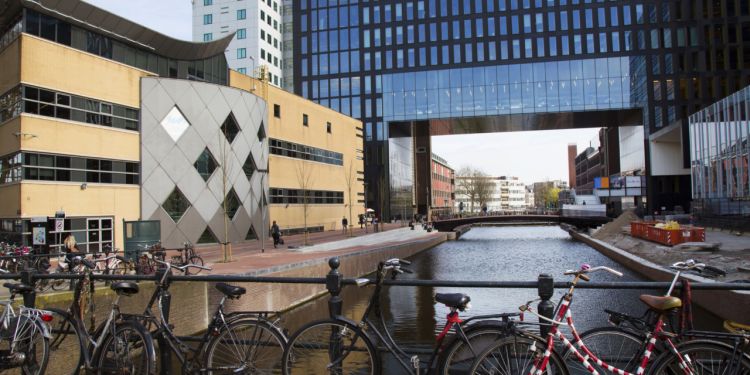
Whether you're a globetrotter or have never left your place of birth, it's always a good idea to visit the Netherlands at least once in your lifetime. It's the land of cheese, tulips, and bikes, plus the country has an amazing and charming atmosphere. But for some people, they may not necessarily want to make a permanent move. A good way to get a taste of the Netherlands is to study here.
Universities in the Netherlands
In this country, there are a total of 41 universities in applied sciences and 14 for research. Here are some of the top universities in the Netherlands and their focus areas.
Delft University of Technology
This is the Netherlands' largest and oldest public technical university. It was established in 1842 and started off as the Royal Academy that trained civil servants and engineers. It gained university status in 1986 and now ranks 48th in the world, which means you'll get an excellent education here. In fact, three Nobel Laureates are associated with this university, such as Simon van der Meer (physics).
Focus areas include computer science, math, and applied sciences. There are eight faculties, which have 14 undergraduate courses and over 30 postgraduate ones. Like some other universities on this list, TU Delft's master's programs are taught in English, but its bachelor's programs are mostly taught in Dutch.
What's unique about TU Delft is it has a strong Sports and Culture Center. You can participate in over 140 sports and creative outlets here.
There are around 18,000 students attending this university every year, and there's no shortage of international students. If you enjoy living in a student town, then you'll feel right at home in Delft. The city is also fantastically located, as it's right between The Hague and Rotterdam.
University of Amsterdam
This is the largest university in the country (it has an enrollment of 24,000 students a year), as well as the third-oldest one. It was established in 1632 and ranks 61st in the world. UvA is one of Europe's largest research universities, seeing as it has great research funding and puts out many scientific publications. So if you want to do research in higher education, then this university is a great choice. Its library has over 4 million books, manuscripts, and more. Plus, there are five museums here, which is excellent if you have some free afternoons.
There's a large range of subjects you can study, including some English programs; there are around 150 degrees you can get in English. However, this university's strengths are social sciences and arts and humanities.
UvA is home to over 3,000 international students who come from over 100 countries in the world. Needless to say, this is a very diverse university. It's very attractive to both international and domestic students since the main campus is located right in central Amsterdam. Other buildings are located all around the city, so you'll get to know the city very well by the time you're done with your studies.
Wageningen University & Research
If you're planning on studying life sciences or social sciences, then this is one of the best universities to attend. They have a particular focus on environmental science, as well as agricultural science, and are ranked 64th in the world.
You'll find 40 English-taught programs here, both for undergraduate and graduate programs. However, if you're planning on getting a bachelor's degree, do note that many classes here are taught in Dutch as well. Overall, there are 20 undergraduate programs and 37 master's programs, and all courses will take you two years to finish.
Over 25% of the student body are international students, and there are around 18,000 students enrolled every year.
While Wageningen isn't located in the Randstad and is in the center of the Netherlands, it won't take you very long to get to Amsterdam if you'd like to spend a weekend there. Wageningen also places you very close to the German border, so there's another option for weekend getaways.
Leiden University
This is the oldest university in the whole country; it was founded in 1575. If you'd like to possibly bump elbows with royalty, or at least attend a university that's seen a lot of Dutch royalty, then Leiden University is great for that. This university has a long history of having the Dutch royal family as students, including the current king, King Willem-Alexander. Many Dutch politicians and other celebrities have also studied at Leiden University, and 16 Nobel prize winners are affiliated with this university, including Albert Einstein.
It's ranked 77th in the world and also has a broad range of subjects to study. There are many English programs here too: to date, there are almost 100, including both undergraduate and postgraduate degrees.
If you're looking for an innovative university, then you'll want to attend this one. They're always experimenting with their teaching styles, which emphasize group work as well as individual work. And you won't have to worry about feeling out of place, as this university has students from 100 countries worldwide.
University of Groningen
This is another university that's pretty old; it came into existence in 1614. It's a pretty widespread campus, as there are 11 faculties and 9 graduate schools. It also has a smaller campus in Leeuwarden. It's an excellent university to attend if you want to do academic research.
The University of Groningen is currently ranked 79th in the world and there's no shortage of subjects to study. You'll find over 180 English-taught undergraduate and graduate programs.
If you want to be in a diverse setting, then you'll certainly feel it here. Around 25% of the student population is international, meaning there are 9,000 internationals from 127 countries.
Those who want to be close to Amsterdam will find this university a bit far. By public transport, it'll take over two hours. However, Groningen has a vibrant student night life since the city has the nation's youngest population, and 25% are students.
Enrollment formalities in Dutch universities
Once you've decided on which university you want to enroll in the Netherlands, the next step is applying. You'll need to first make an account with Studielink. You'll have to go through some steps involving filling out your personal information.
When you've finished, you can then proceed with applying to the universities you're interested in. Then, you'll have to wait to hear back to see if you're accepted or not.
Tuition fees in the Netherlands
A great thing about tuition fees in the Netherlands is the fees are uniform across the board (for students from the Netherlands, Suriname, and EU/EEA countries). This is because the Dutch government sets these statutory fees. For either a bachelor's or master's program in 2024, expect to pay €2,530.
However, if you're from outside the EU/EEA, expect to pay much more. In this case, the institutional fees are set by the universities themselves. For bachelor's programs, expect to pay €6,000 to €15,000 per year. For master's programs, expect to pay €8,000 to €20,000 per year. Do note that while students from the UK counted as EU students beforehand, the UK has made a complete transition for Brexit and unfortunately, UK students will count as non-EU residents. This means your tuition will be much higher than before.
In general, the most expensive degrees are in communication or business management. Also, if you opt to study at a private university, tuition will be much higher as well. If you're on a budget, then some of the most affordable Dutch universities you can consider include HZ University of Applied Sciences, Nijmegen School of Management, HAS University of Applied Sciences, Breda University of Applied Sciences, and HAN University of Applied Science.
Student finance in the Netherlands
Student finance is available for students who are either Dutch or from an EU/EEA country. Not only does this include a regular loan, but also a student travel product, tuition fee loan, and a supplementary grant.
The student travel product lets you use the Dutch public transportation system at either a reduced rate or for free. You can choose between a weekday or weekend product; this can be switched later on if you wish. Technically, the travel product is a loan of approximately €115 per month. Whether you need to pay it back will depend on when you graduate. If you graduate within 10 years, then this loan is considered a gift, so you don't have to pay it back. Otherwise, if it takes you over 10 years to get a degree, you'll have to repay your total "loan" amount. There are some exceptions, such as illnesses, handicaps, or life circumstances, that have caused you to put your studies on hold.
The supplementary grant works like the student travel product. If you graduate within 10 years, then it'll become a gift. Your eligibility will depend on your parents' income, which is calculated with data from 2 years ago. However, if you have issues with your parents (such as if you've got no contact with them), you can request that the university leave their income out of consideration.
If you want to take out a bigger loan, you can do so through the tuition fee loan (collegegeldkrediet). If you're paying the statutory tuition fees, you can borrow 1/12th of the total per month. If you're paying more, then you can borrow a maximum of five times the statutory tuition fee, with a maximum of €964.17 per month for 2023-2024.
If you're a single parent, then you have extra student finance options. For example, in 2024, you can get a single parent allowance of €304.84 per month. Also, if you have a disability or chronic disease and you aren't able to work while studying, you might be able to get the studietoeslag benefit.
Scholarships and grants in the Netherlands
In addition to student finance (or if you can't get it since you're a non-EU student), you can look for scholarships and grants for Dutch universities. Take a look through Study in Holland's study program list and it'll tell you if there are scholarships and/or grants available and if you're eligible for the ones you're interested in. StudyPortals Scholarships also has a great collection of up-to-date Dutch scholarships.
While tuition may be much higher for non-EU students, these scholarship and grant opportunities are still available to you. So search and apply early to secure funding for your education.
The cost of living for students in the Netherlands
The cost of living for students in the Netherlands will depend on where they go to university. For example, if you attend one in the Randstad (such as in Amsterdam or Rotterdam), the cost of living will be higher than living somewhere more rural.
In general, housing in the Netherlands is expensive, so expect a huge portion of your budget to go towards that. If you can get accommodation through your university, make sure to take it, as housing is difficult to find, plus it's pricey. Getting a room through the university will cost a lot less and will guarantee you housing for the school year.
Student life in the Netherlands
If you live anywhere near other students, you're guaranteed to have a good social life. University towns like Amsterdam, Leiden, Delft, and Utrecht all have very healthy scenes for young people.
Make sure you join groups on campus, especially if you find yourself getting homesick. Many of these cater to expat students and help you find others from your home country. Not only that, but you can find others who have the same interests and hobbies as you, which will make it easier to make friends.
You can also join student organizations, which are similar to fraternities and sororities. They'll have their own hangout spots and associated rules and traditions. Some even involve hazing (ontgroening). You won't have to be too afraid, as the activities are quite tame. There are strict laws and regulations surrounding hazing; for instance, freshmen aren't allowed to drink alcohol, and those hazed must have a minimum water consumption and sleeping hours.
We do our best to provide accurate and up to date information. However, if you have noticed any inaccuracies in this article, please let us know in the comments section below.











